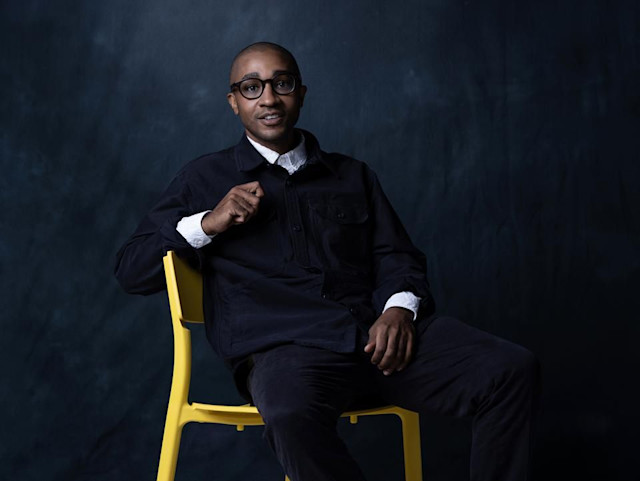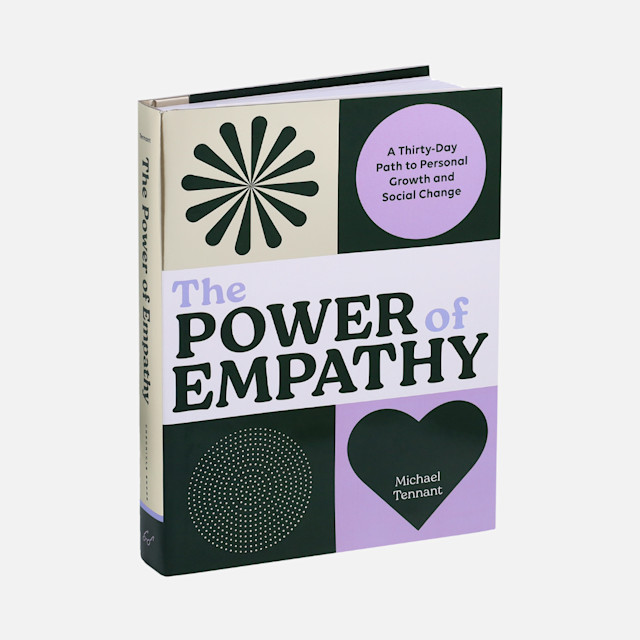The author of 'The Power of Empathy' shares how everyone can benefit from building deeper empathy skills.
In 2019, Michael Tennant was at the lowest point in his life.
Two years prior — and after a successful, 10-plus year career in media — Tennant had left his full-time executive position to launch the purpose-driven company Curiosity Lab. In 2018, he debuted the empathy-building conversation card game Actually Curious “out of this ambitious mission to help fight divisiveness in this country” leading into the midterm elections, says Tennant. The game was immediately popular, but by the following year, Curiosity Lab was failing and Tennant’s relationship with his former business and romantic partner had ended.
Then, tragedy hit.
Two of Tennant’s three older brothers passed away in close succession in 2019, hardships that took place only months after Tennant had lost an uncle and, soon after, an aunt. The trauma from these losses revealed the fragility of Tennant’s mental health — and his lack of understanding surrounding his own emotions. “I had a really shallow sense of how to cope with difficulty,” says Tennant, who grew up in the Bedford-Stuyvesant neighborhood of Brooklyn with his brothers and Jamaican immigrant parents before going to boarding school in Pennsylvania at the age of 12.
“For years, I excelled as a bit of a workaholic, which I had come to learn was one of my coping mechanisms,” he adds. “I’d struggled with substance use, and even though it was pretty benign — until it got worse and it actually affected my ability to engage with people in public — it made me even more introverted and withdrawn than was natural to me.”
Tennant realized his survival was dependent on confronting his emotions and learning to cope in a healthy manner. So he turned to Actually Curious — and to his values that led him to create the game to begin with. Tennant took the cards on the road, traveling around the country, having conversations with strangers, and developing his Five Phases of Empathy model.
“[I was] exploring both how to heal from really big losses but also how to disentangle from toxic coping mechanisms,” he says, adding that this experience “really helped me to channel my grief and difficult emotions into my purpose. … When you’re experiencing really difficult emotions, that energy can be channeled into something really meaningful.”
When you’re experiencing really difficult emotions, that energy can be channeled into something really meaningful.

It wasn’t long before Tennant became a sought-after and award-winning expert. He has hosted free virtual “empathy workouts,” led workshops, and educated leaders at organizations like NASA, Stanford University, and Bumble on how to build more empathetic and inclusive — and thus, successful — workplaces. Actually Curious, meanwhile, expanded to five editions.
Last month, Tennant, who currently splits his time between Florida and Copenhagen with his wife and their 14-month-old daughter, published 'The Power of Empathy,' bringing his expertise and insight to an even wider audience. The book provides an easy-to-follow guide to building or strengthening your own empathy skills — both in relation to yourself and to others — with journaling prompts, mindfulness exercises, and more, along with stories of Tennant’s own journey.
Ahead, Tennant shares more about his inspiration, learning to take care of himself, and why everyone can benefit from building empathy skills.
RELATED: How to Balance Self-Discipline with Self-Compassion
What led you to become an empathy expert following the deaths of your brothers?
“It ended up becoming this sought-after thought leadership when I made the connection that the same difficult emotions that I didn’t know how to face [in order] to heal were quite similar to the difficult emotions we face when we’re trying to challenge bias on either side of the equation — whether you’re advocating or trying your best to live your values but are facing shame, or anger, or fear. I started being called into spaces to help bridge gaps using that model, and ever since receiving that calling, I’ve been going deeper into learning and making sure I’m prepared for the responsibility…instead of running away from it because it is quite challenging.
“The book outlines this ‘five stages of empathy’ model that I’ve been teaching in workshops, but I added a sixth phase because what I’ve learned is this work is really hard when you do it in an extended, high-frequency way. It’s been wonderful to get called into that work and step into that responsibility and then to create a framework others can follow and tap into the skill sets necessary to bring empathy to their communities.”
How did the idea for 'The Power of Empathy' book come about?
“In June 2021, I conducted a workshop and I didn’t get anything back from the audience — I was dripping in sweat, it took me several days to undo the knots that were in my shoulders, and I realized that this wasn't just a one-time thing. It was indicative of the waning passion that I’d experienced over the preceding months of facilitating, and I decided to take my energy back from that form of investment.
“Like I said, the book has a model called the Five Phases of Empathy, with a sixth phase added specifically for the book. The third phase is channeling purpose — looking at how you’re investing your energy and asking questions like, ‘Is it moving you toward your purpose? Is it nourishing, or is it taking away?’ That’s a combination of phase three ‘channeling purpose’ and phase four ‘from empathy to impact,’ where you look at the different communities in which you invest your time and energy. Through that model, I looked and said, ‘I’m not going to invest my energy as heavily here, and I’m going to do something that’s really nourishing me, which is writing and unpacking this in a more solitary way.’ At this point, I was even coming to grips with understanding how introverted I really was and how I needed to give myself that grace. So I decided Juneteenth 2021, I was going to start taking my energy back, and over the next week or so, I started unpacking an outline of what has now become 'The Power of Empathy.'”
How has your past impacted your journey?
“My experiences being the youngest in my family, being smaller than my brothers, going away to boarding school young, and being both small and one of few Black kids in a school with kids of elite power made it such that my youth and my adolescence, I had to do a lot of navigating around personalities, and a lot of lowering my ego, to fit in and to survive. That’s played a huge part in me being so willing to try to unpack what it looks like to lower your ego, how it feels to have grace, to have learned what it feels like to be around people who don’t treat you that way.”
RELATED: Mental Fitness: Neutral Thinking
Why do you think people struggle with empathy?
“Feeling deeply is not something we’re all taught to do. There are myriad escapes, from our entertainment to…the culture of vulnerability in our families and our friend groups. We don’t really have a cultural muscle for feeling out in the open, and we’re just starting to develop the right kind of language and lexicon and confidence [and] using it to speak and to bring emotions more frequently into our interactions. And then that permeates into our workplaces.
“And I think that oftentimes the most popular definition of empathy is one that’s very outwardly focused and one that requires giving of compassion, giving of sympathy, and when many of us are struggling or working on our own healing — or not even working on it, just living and not even bringing any intentionality to it — the idea of leaning into giving more that you don’t have is daunting.”
That said, why do you think your work resonates with so many people?
“I think it gives people hope and gives people a tangible thing to do with that hope. I think deep down inside, even though we confront some really challenging things that make us question humanity on a daily basis, at the core we’re hopeful. It’s something that I think helps the product to resonate from a commercial sense, but also when people do get to engage with it, it makes them love it and talk about it.”

How does your work with empathy foster greater inclusivity?
"'The Power of Empathy' leans more toward supporting the individuals and making sure they have tools to show up with consistency when advocating for the things they believe in, but also to support themselves better in terms of knowing when they need rest, recharge, or help. For the individuals who are trying to advocate [for inclusivity] but find it difficult, we are equipping them with the ability to more intentionally examine the emotions that show up and how that gets in the way of the progress they want.
“From an organizational standpoint, what ends up happening is, if you can authentically train leaders from C-suite out to people leaders and train ERG [employee resource group] leads in these skill sets, not only are they more effective at advocacy [and] identifying when they need to speak up to protect safe spaces in settings where that’s not happening organically, but also at taking care of themselves, so they show up day in and day out.
“I think oftentimes where this ends up resonating the most within organizations and getting approved when they realize the impact that having employees feel safe has on retention and on long-term chemistry, which then affects the groups that are innovating together and bringing their differences together in a way that’s additive and not detracting. Empathy is a game-changer. And the more that organizations look at, ‘Hey, how am I fostering this?’ How am I weaving this into the DNA?’ then they are really equipped to try to achieve that dream of inclusion being a part of their DNA rather than an initiative-based thing in their culture.”
RELATED: Why You Should Be Kinder in the Workplace
What is the biggest misconception about empathy?
“The biggest misconception about empathy, I would say, is that you need to give sympathy to people who are less fortunate than you regardless of its effect on you. There’s some truth and beauty in approaching empathy in that way, but I think if you were to approach empathy in that way without any boundaries for yourself, you’re going to burn out. That’s why we have so many individuals in education and in frontline fields like medicine and therapy who are burning out because maybe there’s a lack of balance and culture around shame in taking care of ourselves.”
What does curiosity mean to you?
“Curiosity is one of my core values, and what it means to me, in some ways, is permission to live in a way where I’m not actually conventional. It gives me that anchoring value. The reason I decided to be an entrepreneur, traveling around the world trying to spread empathy, really springs from this playfulness. But I also think that curiosity is this powerful and relatable value; it leads to growth, it leads to connection, it’s what we see when we are in awe of a child, and it’s just beautiful. I’m really grateful to anchor a whole business around that value.”
How do you take care of yourself when you’re not working?
“I think the beautiful thing about how I take care of myself, and what is introducing 'The Power of Empathy,' it really is a daily check-in process of where I am emotionally, where I am in terms of stress, and what I can do differently to feel more well. I’m an avid runner and I am also a fairly regularly practicing yogi. I journal every single morning, and these days I’m really looking at how to optimize my life. I like to remind myself of the most challenging days that I’ve architected in this life; I’ve picked this. I don't really have anyone forcing me to do anything, so I also have permission to recreate. It's an ongoing process of weaving in intentional check-ins of how I’m spending my time and how’s that landing in my body. I’m really excited for 'The Power of Empathy' to bring the tools and practices that I use to do that into individuals’ lives as well, to help them optimize how they take care of themselves.”
What do you hope people take away from your book?
“I hope that people take away that practicing empathy is possible, is accessible, and it’s fun. It’s also something that once you’ve done it for yourself, it’s repeatable and becomes part of your process and way of being. And it’s something that is easy to teach in bite-sized forms.”
